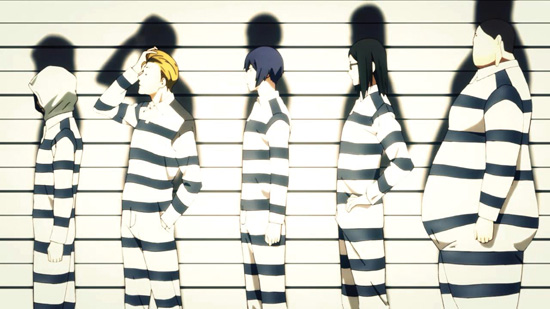
Prison School is pure id, the sort of utterly shameless concept whose unprecedented levels gives self-styled “art connoisseurs” the necessary levels of disdain they need to continue functioning.
Early in the career of manga author Akira Himamoto, his editors tasked him with creating Me and the Devil Blues: a visually experimental blend of supernatural horror and biography of African American blues musician Robert Johnson set in the American South circa the early 1900s. It was the sort of comic that garnered critical acclaim but was read by few. I like to imagine Himamoto in frustration screaming, “FINE, YOU PEOPLE AREN’T INTERESTED IN CELEBRATING FINE ART? WELL THEN, HERE! IS THIS WHAT YOU WANT?!” when conceiving of Prison School, though the answer turned out to be “yes” far beyond anyone’s expectations.
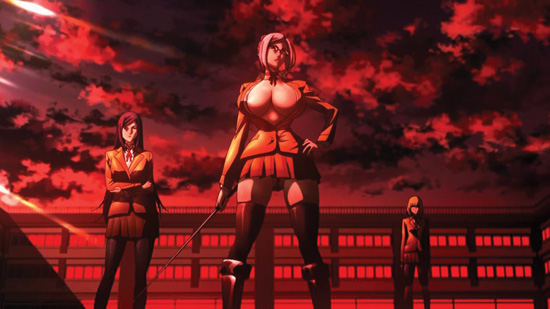
It’s easy to look at the name Prison School combined with virtually any promotional material and then dash off to the “public display of outraged self-assurance” races. The problem with that line of thinking is that actual pornography is freely available; something besides titillation must be the catalyst for this mania that has resulted in the manga being adapted both to anime as well as live action. That “something” is that Prison School’s plotting and characterization are simply too well crafted to write it off as mere exploitation, though make no mistake: it undeniably IS that.
Japan’s most prestigious all-girl’s boarding school has opened its doors to male students, starting with five freshmen. Relishing the opportunity to finally see girls undressed firsthand, the quintet quickly venture forth down the 1980s teen sex comedy path only to be thwarted by a trio of girls who comprise the Underground Student Council, which like all anime student councils hold immense authority that trumps faculty. For their wickedness, the boys are sentenced to serve hard time in a literal, bona fide prison which just so happens to be on campus grounds and under the sole jurisdiction of the Council. Treatment is harsh, and escape attempts will be met with extensions of sentences followed by expulsion. Sentencing is collective: if one misbehaves, everyone pays the price.
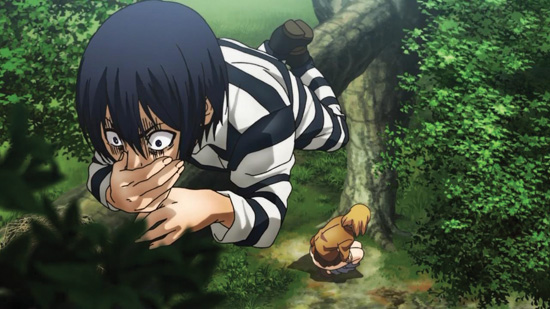
Although their sentence lasts just one month, the alleged main character Kiyoshi has promised to go on his first date in just two weeks. Breaking out is imperative. But the true hero is Gakuto, a classic otaku who speaks in antiquated language out of his devotion to Romance of the Three Kingdoms. Limited edition figurines come out within that timeframe, and he must have them … no matter the cost! But do the other inmates share their desires for freedom? Joe is always wearing a hood and coughing up blood, and seems to care only about ants. Shingo is a troublemaker who’s known Kiyoshi since middle school. Andre is morbidly obese and his face is entirely too tiny for the rest of his head. In fact, his face seems to get tinier with each passing episode. Why might those three prefer imprisonment? Therein rests the superficial appeal aspect to Prison School: Punishments are doled out by the Underground Student Council personally, and each conforms to a dominatrix archetype.
In any prison drama, the concepts of “good” and “evil” are all relative, and while the trio comprising the Underground Student Council may claim to occupy a moral high ground, they’re awfully sadistic. The president is Mari, a refined, well-mannered ice queen who commands an army of crows. The secretary, Hana, is a “yandere”: seemingly sweet but actually a psychopathically violent karate master. In a series devoted to laughing at the suffering of others, Hana probably has it worst.
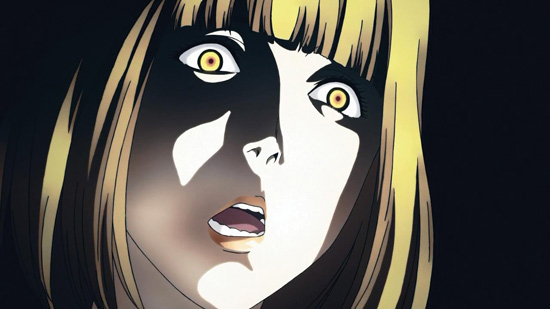
But the alpha and omega of all things Prison School is Meiko, the vice president. With her glasses, hair bun, stiletto high heels, criminally short skirt which does nothing to conceal her lace panties that are eternally bunched up to create the mother of V-wedgies, riding crop, and always open blazer revealing her outrageously colossal bra-less jiggly breasts which could pop out at any moment, one’s reaction to the vice president is the litmus test for the series overall.
Barely an episode goes by where she doesn’t strike, slam, stretch, or smother somebody, typically with comically bloody results due to her abnormal strength. The camera is either pointing right up her skirt or down her massive cleavage whenever she is around—which is often—resulting in the original broadcast of Prison School employing copious amounts of censorship not present on the home video release. The vice president certainly raises the bar for pandering fanservice, and for these boys, being battered senseless by someone whose idea of torture is to sit on your face and smack you is a dream come true!
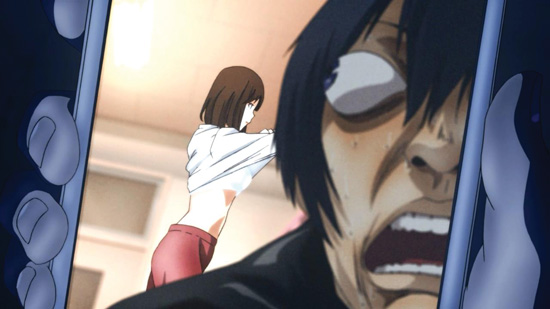
Gross-out humor abounds. Bodily fluids factor heavily into the jokes, mostly by way of profuse blood loss or sweat. Embarrassments and misunderstandings where characters are literally caught with their pants down are rife. But it’s all in service of breaking out. No good escape goes off without a hitch, and there are constant moments of suspense every step of the way as plans fall apart due to unforeseeable complications. The 12 episodes move along at breakneck speed, covering roughly one entire manga volume’s worth of story per episode.
Developments are constantly unfolding and the tension rarely lets up. That’s what makes you want to see the next episode immediately. That’s why the manga’s won awards and sold millions of copies, and this anime is one of the best series of 2015. That’s what prompted the live-action adaptation by Noboru Iguchi (The Machine Girl, RoboGeisha). The potential of seeing a girl’s nipples exposed or a guy lose several pints of blood rectally is of lesser importance by comparison (but you’ll get that too). Regardless, those easily offended—that’s you if you’ve ever referred to a piece of media as “problematic” with no further elaboration—would do best to stay away from Prison School.
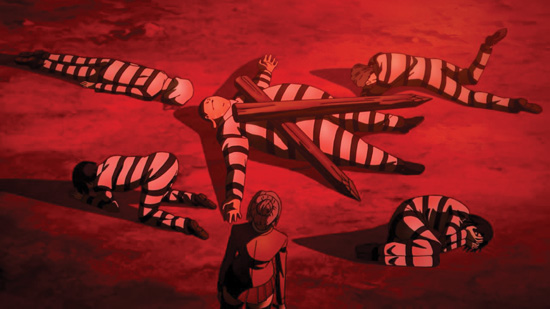
Prison School combines the surreal stupidity of Cromartie High School with the crass vulgarity of Detroit Metal City, with similarly high levels of comedic enjoyment—it IS a comedy, after all—but those are merely the metaphorical icing on the saw-concealing cake. The true secret behind its success is that in addition to the bawdy laughs there’s a genuinely compelling escape/heist narrative at play. The first major arc of Prison School concludes within these 12 episodes, but this doesn’t even cover 50% of the manga! Additional seasons could easily be made, but in the event this is all that we end up getting, every conflict presented is resolved. What happens afterward, you wonder? Suffice it to say that if there’s an “underground” Student Council, then that suggests there’s a “regular” one too.


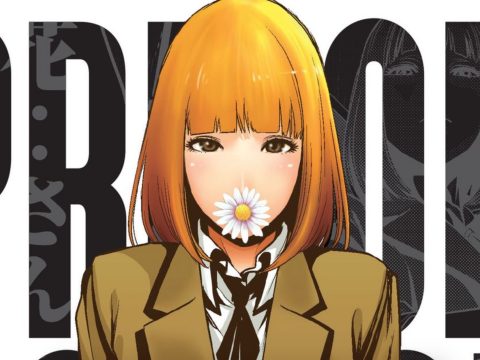
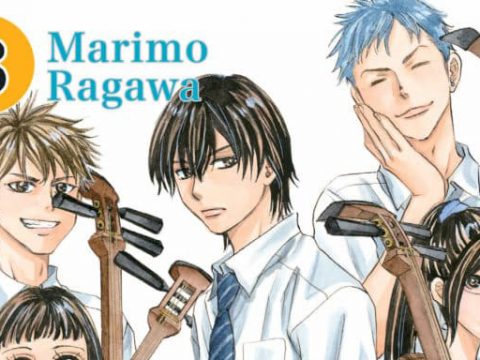
![SSSS.Dynazenon [Anime Review] SSSS.Dynazenon [Anime Review]](https://otakuusamagazine.com/wp-content/uploads/2021/08/16-9-SSSS.Dynazenon_Key_Visual_3.5-480x360.jpg)
![Back Arrow [Anime Review] Back Arrow [Anime Review]](https://otakuusamagazine.com/wp-content/uploads/2021/07/ba15-02686-480x360.jpg)
![Dawn of the Witch [Manga Review] Dawn of the Witch [Manga Review]](https://otakuusamagazine.com/wp-content/uploads/2021/07/16-9-DawnoftheWitch-cvr_02-480x360.jpg)
![Nina The Starry Bride [Manga Review] Nina The Starry Bride [Manga Review]](https://otakuusamagazine.com/wp-content/uploads/2021/07/nina-the-starry-bride-v1-16-9-480x360.jpg)